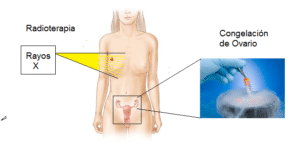Pregnancy, therefore, is not impossible for women in menopause, it is only necessary to apply a fertility treatment that solves the problem of the absence of eggs.
There is a widespread belief that menopause means the end of the reproductive stage in women. From a hormonal point of view, menopause is the absence of egg production and therefore also of estrogen. It is therefore true that, without these elements, it is not possible to carry out a pregnancy naturally, but this does not mean that a woman cannot become pregnant once she reaches menopause.
Menopause and pregnancy
Although the menopause involves the completion of the hormone production necessary to carry out a Pregnancy by natural means, the pregnancy itself can take place if the uterus is in good condition and there is a donor who provides her eggs.
In this way, fertilization takes place in the laboratory, where the sperm of the parent are joined with the eggs of the donor. Once this process, popularly known as “in vitro fertilization”, has been carried out, fertility specialists select the most suitable embryos to be implanted in the woman’s uterus, and from this moment on, the pregnancy develops as normally as in any other case, since the absence of hormone production (menopause), It is replaced by the hormonal production of the placenta.
Therefore, from a medical point of view, menopause does not imply the impossibility of pregnancy occurring, but only a limitation in relation to the way in which it can take place. While a woman produces eggs normally, she can, if there are no other complications, get pregnant naturally, but if she no longer produces them, for whatever reason, she will still have the option of getting pregnant pregnant as long as she uses in vitro fertilization techniques. It is possible to achieve a Pregnancy in menopause.
In Vitro Fertilization: Alternative to Menopause
In vitro fertilization is not as complex a technique as you might think. Basically, it consists of recreating in the laboratory the process of union of a sperm and an egg, which usually takes place in the woman’s reproductive system.
That is, the woman who, having reached menopause due to her age, or who cannot produce eggs for other reasons (ovarian removal, chemotherapy, etc.), can continue to have motherhood at her fingertips, simply by making use of this technique, and using eggs provided by a donor.
Pregnancy, therefore, is not impossible for women in menopause, it is only necessary to apply a fertility treatment that solves the problem of the absence of eggs.
In this video the Doctor Carlos López Clavijo, Gynecologist Specialist in Human Reproduction at the Inser Fertility Institute, expands on concepts about pregnancy during menopause.

